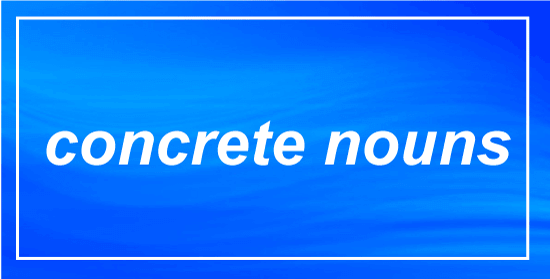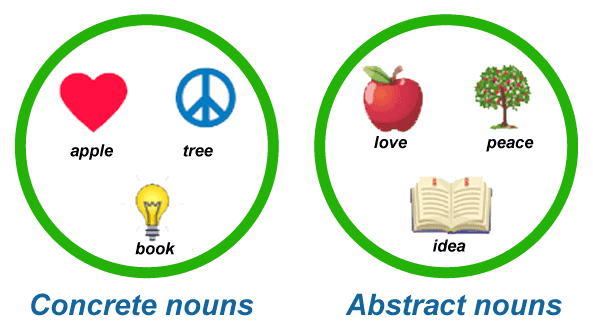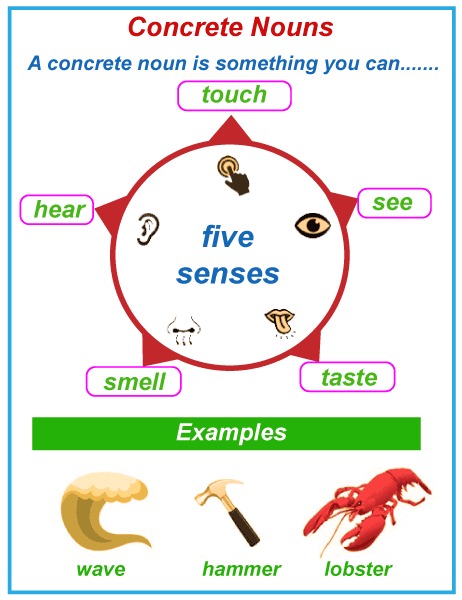Concrete NounA concrete noun is just an individual, location, or object that you can perceive with one or more of your 5 senses. Take a glance around you, and you'll notice that almost all nouns are concrete nouns. 
This is a type of noun that is something that can be recognized using at least one of the five sensory feelings (tastes, touch, vision, hear, or smell). Consider the following examples: Could you kindly answer the phone? The noun "phone" in the above-mentioned phrase is a concrete noun: one can see it, and possibly even touch, smell or taste. What is that noise? So, although noise cannot be touched and may originate from multiple sources, it is a concrete noun because it can be heard. Mr. James followed his dream of photography of the sunsets after retiring. Sunsets are concrete nouns in the sense that they can be seen. Mr. James is also a concrete noun, but dreams and retiring are not. This type of noun is known as an abstract noun. This brings us to an important section- What are abstract noun? And How they differ from the concrete noun. The Difference between Concrete Noun and Abstract NounIt is not a concrete noun if the person can-not view, hear, taste, feel or touch, or smell it. Concrete nouns are distinguished from abstract nouns, which refer to objects that cannot be seen, heard, touched, smelled, or tasted. Consider the abstract terms "parenthood" and "devious." These are undetectable to the human 5 sense. Of course, you can experience "woods" and "sweets" with your sensations; these are concrete nouns or tangible nouns. It can be troublesome to differentiate amongst the concrete and the abstract noun. Be mindful that whether a noun is concrete or abstract may be determined by circumstances or even the classifier's interpretation of perceivable. 
My upcoming work of art will necessitate some hard work on my side. (No one can deny that the initial "work" in this phrase is a concrete noun.) The second "work," on the other hand, is more subjective. When it refers to "a task requiring effort," "work" is categorized as an abstract word. Some might say that you can sense work and label it as concrete as well.) Some nouns will have an abstract meaning in one context but a concrete sense in the other. For instance, you might be able to trick the voting people but not the environment. (It's concrete when "environment" alludes to the envelope of gasses that surrounds the Earth.) Russia has an environment of darkness and secrets. (When the term "environment" relates to the mood of the location, it is an abstract noun. 
Concrete Nouns of Various TypesConcrete nouns include:
The majority of concrete nouns are quantifiable, which means they can e counted and, which implies they can be solitary or plural. For example;
Concrete Nouns ListLet's go over some concrete noun instances to refresh our memory. We'll assign each term to one of the five senses to assist in understanding these notions, but you might easily perceive many of the items on this list using more than one sense. Ones that can be seen: portrait, illustrations, novel, exhibit, performance, film, tv, sketch, note, handwritten note, file, and so on Smells like cheeses, flowers, musk, scent, bakeries scent, odors, mold, and coffee. That can be Tasted: grilled cheese, pastry, food, sweets, chocolate, beer, yogurt, Blue Raspberry, Cheetos, Milk Tea. That you can Hear: sirens, whistles, a ringing, trumpet, a violin, a chiming, melody, and so on Ones that you can Touch: sawdust, sheet, laptop, banknotes, soil, plastic materials, small stones, garbage, rollers, iPhone, the Eiffel Tower, air, fire, wind How to Make Use of Concrete NounsThis form of the noun, as with most concrete nouns, is utilized in English grammar to assist or to produce vivid sensory language that really can exhibit strong imagery and elevate your work to the next dimension. Below are mentioned some of the essential points that can be helpful in utilizing concrete nouns correctly.
Next TopicCompound Noun
|
 For Videos Join Our Youtube Channel: Join Now
For Videos Join Our Youtube Channel: Join Now
Feedback
- Send your Feedback to [email protected]
Help Others, Please Share










